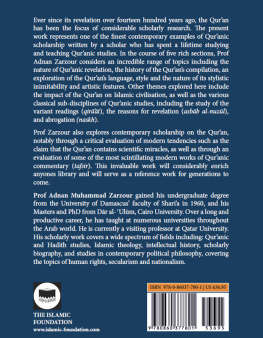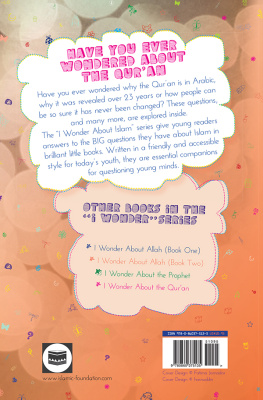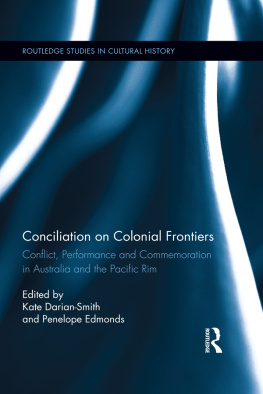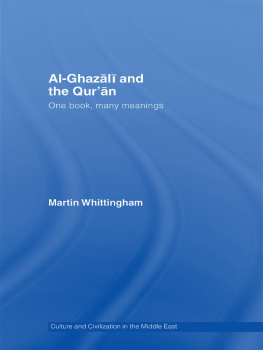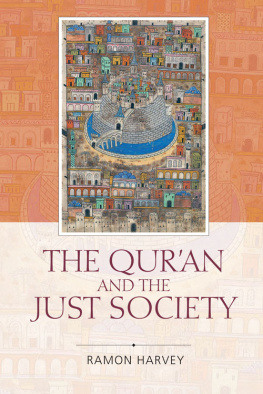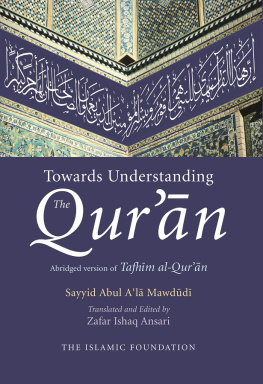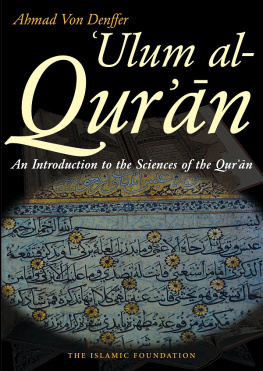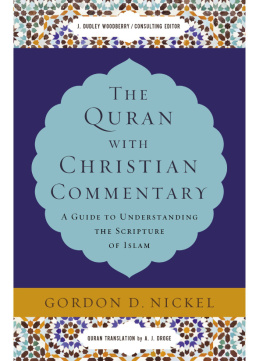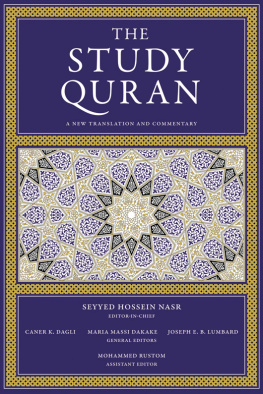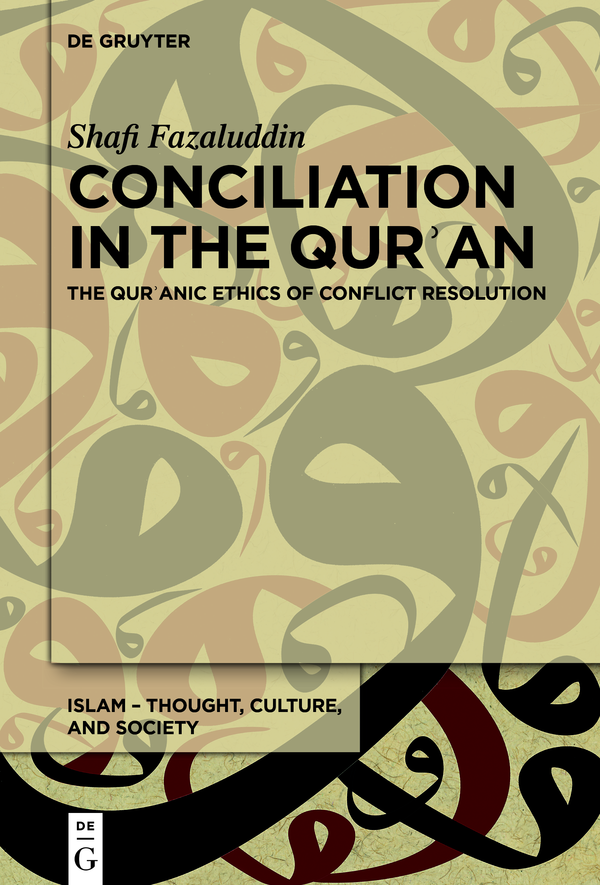Islam Thought, Culture, and Society
Volume
ISBN 9783110747201
e-ISBN (PDF) 9783110747348
e-ISBN (EPUB) 9783110747461
Bibliographic information published by the Deutsche Nationalbibliothek
The Deutsche Nationalbibliothek lists this publication in the Deutsche Nationalbibliografie; detailed bibliographic data are available on the Internet at http://dnb.dnb.de.
2022 Walter de Gruyter GmbH, Berlin/Boston
Dedication
This book is dedicated to the memory of my late parents, Mr. M. Fazaluddin and Mrs. S. Fazaluddin, who first encouraged me towards the pursuit of knowledge, particularly in the field of Quranic Studies. A special mention should also be given to their notable teacher and renowned exegete of the Quran, the late Professor Abdul Qadeer Siddiqui, the first Dean of the Faculty of Theology at the Osmania University, Hyderabad, India.
Acknowledgements
I would like to express my appreciation for the support and encouragement of Professor M. A. S. Abdel Haleem and Professor A. H. I. Al-Matroudi of SOAS, University of London. Both were inspirational teachers during my academic venture into Quranic Studies, and later became guiding mentors and supportive supervisors of my doctoral thesis, on which this book is based. Mr. I. D. Edge at SOAS acted as a third supervisor of the doctoral thesis, providing a valuable legal perspective on the research. Also at SOAS, Dr. Yenn Lee provided motivation and helpful suggestions as the research progressed, and Mr. Ahmed Al-Khashem was consulted in respect of some Arabic terms.
Professor Ian Netton of Exeter University and Dr. Salwa El-Awa of Swansea University both offered their advice and kind encouragement with regard to the publication of this work, and Dr. El-Awa in particular provided detailed suggestions for its development.
I would like to thank the whole team at De Gruyter for their efforts in the editing and publication of this work, with special thanks to Dr. Sophie Wagenhofer and Katrin Mittmann for their valuable suggestions, and their pleasant and efficient handling of the entire process to publication.
I would also like to thank my family and friends for their support throughout. My children Habeeb, Kareem, Raheem and Hakeem provided enthusiastic encouragement together with their mother Dr. U. Hussain who also kindly reviewed some of the drafts and provided editing suggestions.
Notes
The doctoral thesis on which this book is based was completed at SOAS, University of London, in September 2019 and the doctorate degree was awarded in July 2020.
Chapter 2 of this book has previously been published as an article in adapted form (Fazaluddin S., Conciliation and Conflict in the Meccan and Medinan Quran: A Thematic Study of Suras 6 to 9, Journal of Quranic Studies, October 2020, vol. 22, Issue 3, pp. 63101).
Introduction
Despite its nature as a historical, religious text, different interpretations of the Qurans social message regarding intra-community and inter-community relations can have significant contemporary implications. A balanced understanding of this important aspect of the Qurans discourse is therefore crucial, particularly in light of increasing diversity resulting from global migration. An over-riding focus on conflict in the Quran by historical and contemporary commentators has, however, obscured the subject of Conciliation in the Quran, which remains an under-researched field of study. This study aims to analyse, and evaluate the importance of, Conciliation in the Quran to provide a more balanced and complete understanding of the Qurans perspective on social relations.
Traditional Islamic authorship on the subject of Conciliation in the Quran, such as .
Whilst much has been written about Conciliation in Western literature, there is a dearth of material on the subject in relation to the Quran. In my previously published research on Conciliation Ethics in the Quran (, pp.33639), I included a review of literature regarding the importance and application of ul, and discussed some Western Conciliation theories which I also reference in this work. The same paper deals extensively with Conciliation in the context of marriage by reference to Q.4:35 and Q.4:128, mentioned above, and other verses. I will therefore not address this subject matter again in this research but provide a brief summary of the key points arising from the earlier analysis in Chapter 1.
Scope of Research and Research Questions
This research aims to redress the fragmented approach of existing research, by examining Conciliation as a holistic concept and evaluating its relative importance in the Quranic discourse. This will necessarily result in a broader interpretation of Conciliation than mere Quranic references to ul, and may bring to light new concepts whose relevance and significance becomes fully apparent only after a detailed investigation. In examining Conciliation in the Quran, I consider the notion of Conciliation in its modern usage, where most definitions indicate the following two meanings:
the informal restoration of good relations between two parties or perspectives, and
the use of certain formal processes to resolve actual or potential legal disputes through an intermediary.
In line with my holistic approach, I will also examine those matters that deal with the avoidance of conflict, which may be considered a form of pre-emptive Conciliation. A holistic study of my subject will also necessitate a study of both Social and Divine-Human Conciliation, given the Qurans dual societal and theological narrative, although Divine-Human Conciliation will predominantly be studied as a means to informing the primary study of Social Conciliation. In order to provide an appropriately balanced analysis, I will additionally engage with significant segments of text which deal extensively with conflict, although my study will be limited to how conflict relates to Conciliation rather than providing a complete study on conflict of itself. I will also discuss the use of persuasive argument in the Quranic discourse, in order to explain its essential role in the proper contextualisation of the Qurans engagement with conflict.
In order to analyse and assess the relative importance of Conciliation within the Quranic discourse, I will address the following specific questions:
How pervasive is Conciliation in the Meccan and Medinan suras?
What range of aspects of Conciliation are manifest?
What, if any, literary techniques are used to emphasise Conciliation?
How coherent is the Conciliation material?
Question 1 will include a comparison of how pervasive Conciliation is in the Meccan and Medinan suras, to evaluate a suggestion of greater belligerence in Medinan suras (literary techniques in fully understanding the meaning of a text and conveying the attitude a text imbues towards a given subject, as explained towards the end of the Introduction in the section Research Framework and Methodology. Finally, Question 4 follows from an increasing contemporary academic interest in perceptions of the Quran as a coherent text based on different theories of nam (arrangement), which are explained and discussed further below in the section of the Introduction entitled The Development of Coherence Studies. Although there may be an element of inherent coherence in Quranic exegesis, as explained in the Research Framework and Methodology, it should be possible to go beyond this interpretive level to evaluate overall patterns of structural and thematic coherence in the Conciliation material examined.



